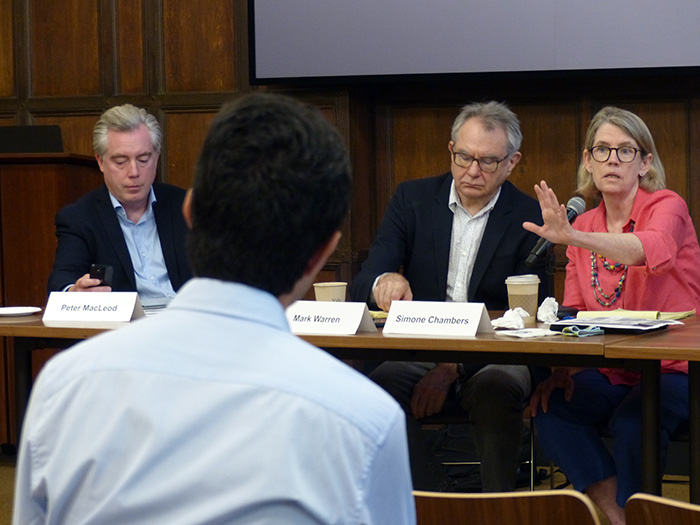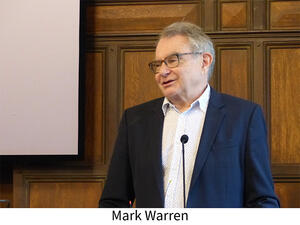Experts Gather at Yale to Discuss the Past and Future of Citizens’ Assemblies

In 2004, the province of British Columbia in Canada invented and held the first modern citizens’ assembly to address growing tensions with its first-past-the-post electoral system.
Citizens’ assemblies are large groups of randomly selected citizens convened to deliberate and recommend policies. And even though a referendum to implement the British Columbian assembly’s recommendations failed to meet a super-majority threshold for passage into law, deliberative mini-publics — as this kind of democratic innovation are now known — have grown in popularity.
Last month, the Institution for Social and Policy Studies co-sponsored a conference to celebrate the 20th anniversary of the British Columbia Citizens’ Assembly on Election Reform. Scholars and practitioners gathered to discuss the status and trajectory of efforts to refine and expand this democratic innovation.
“Where we stand today is a conversation between past experience and future potential,” said Antonin Lacelle-Webster, a postdoctoral fellow with ISPS’s Democratic Innovations program. “Our current practices face many challenges, presenting risks and opportunities for democracies as we move beyond the last 20 years and engage with issues that will shape our future.”
Lacelle-Webster organized the event with ISPS faculty fellow Hélène Landemore, co-leader of Democratic Innovations, an ISPS program to identify and test new ideas for improving the quality of democratic representation and governance. Recent events have included conferences exploring the latest research on how emotion and identity can influence the formation of political judgment in deliberative systems, how to govern citizens’ assemblies, and both how to govern artificial intelligence and govern with artificial intelligence.
In addition to ISPS, the latest conference was sponsored by the Whitney and Betty MacMillan Center for International and Area Studies at Yale, with support from The Edward J. and Dorothy Clarke Kempf Memorial Fund.
Mark Warren, a professor of political science and emeritus Merilees Chair in the Study of Democracy at the University of British Columbia, argued that the assembly in 2004 was a new kind of representative institution, in which 160 citizens represented 4.2 million of their fellow citizens. Warren, the recently departing president of the American Political Science Association and co-editor of a book about the process, praised the effort for its inclusive composition and the new kind of accountability it offered the people of British Columbia.
“Surveys suggested that the more people knew about the citizens’ assembly, the more they tended to like it and endorse its recommendations — a remarkable achievement in an era in which distrust of political institutions runs high,” Warren said. “They liked that it was made up of people very much like themselves.”
Simone Chambers, professor of political science at the University of California, Irvine, worked with Warren and others to study the British Columbia citizens’ assembly. At the Yale conference, she celebrated the development of modern-day deliberative democracy from its modest origins into a deeply researched political theory. And she suggested that proponents of citizens’ assemblies should not justify them by denigrating traditional representative democracy.
“We hear people arguing how deliberation in the mass public sphere is subject to manipulation, cognitive biases, and lack of knowledge that we can correct with mini-publics,” Chambers said. “But this strategy can only marginalize citizens’ assemblies and deliberative mini-publics, labeling them safe havens where supposedly ‘real’ democracy is going on. Because we are not going to get rid of the mass pubic or elections, we need to emphasize how one can positively influence the other.”
Chambers cited data showing how not only do people who learn about assemblies appreciate their inclusivity but also their ability to become experts in the issues under deliberation.
“People would think, wow, they spent a year thinking about this and now probably know more about it than elected representatives,” Chambers said. “We can use deliberative mini-publics as opinion leaders, educating voters. It’s important to make that argument if, like me, you reject arguments that the mass public is hopeless.”
One innovation of the British Columbia Citizens’ Assembly on Electoral Reform, as noted by Spencer McKay, a postdoctoral fellow at the University of British Columbia, was its pairing with a referendum. McKay and Giulia Oskian, an assistant professor of political science at Yale, engaged with questions surrounding the types of referendums put in place.
Lewis Krashinsky, a postdoctoral fellow with the University of Toronto’s Department of Political Science, discussed criticisms of citizens’ assemblies and their association with referendums based on a paper he wrote with Christopher Achen, Roger Williams Straus Professor of Social Sciences, Emeritus at Princeton University.
“We didn’t stake out any ground on the question of whether citizens’ assemblies are good or bad for democracy, only whether the mass public really listens to what these assemblies say,” Krashinsky said. “What we uncovered in our work is that when referendums are introduced at the end of the process, partisanship largely drives how people vote. It was the party they identify with that mattered and not really consideration of the work the assembly did.”
Their research found that people do not behave differently in a vote following a citizens’ assembly than they do in other elections.
“In British Columbia, the citizens’ assembly didn’t help drive further support for electoral reform,” he said. “What it actually did was remind people where their party stood on the issue. If I’m a major party voter, and if my party is going to be hurt by electoral reform, I’m going to vote against it. And if I’m a minor party voter or a smaller party voter, I’m going to vote in favor of electoral reform because that’s something that helps my partisan cause.”
Peter MacLeod, founder of the deliberative democracy organization MASS LBP, said the super-majority threshold of the referendum on electoral reforms in British Columbia was “unrealistic.”
“Let’s stop seeing it as a failure,” MacLeod said. “Fifty-eight percent is greater than any group of Canadians have ever voted for anything.”
He called for patience and a commitment to the necessary, hard work of improving democracy.
“The innovation that interests me most is perhaps the most boring, and that’s the sustained innovation required to properly stitch a lasting institutional compact between deliberative processes and our existing legislative institutions,” MacLeod said. “Fundamental changes in governance culture are not measured in decades but often in centuries. So, this is a long project that many of us are signing up to.”
Participants at the conference said this work of improving democracy has led to new iterations of citizens’ assemblies, reflecting their implementation in diverse settings, and opened up ongoing discussion about their integration within political systems.
ISPS Director Alan Gerber, Sterling Professor of Political Science, praised the conference as the latest in the Democratic Innovations program’s ongoing exploration of new possibilities for democracy through citizen participation.
“Through events like this, Hélène, Antonin, and their colleagues provide an invaluable opportunity to accelerate discussion and engage with new ways to think about governance,” Gerber said. “This is the work we must continue for democracy to adapt and thrive.”
A final discussion on the future of citizens’ assemblies emphasized their role in addressing societal challenges, such as climate action and political representation, while maintaining their democratic legitimacy and innovative potential.
The reflection about citizens’ assemblies and their contributions continues to evolve. Warren devoted his presidential address at the APSA annual meeting earlier this month to the topic of democratic innovations, stressing the important contribution of citizens’ assemblies for the future of democracy and the challenges ahead.
And even as MacLeod and other proponents of citizens’ assemblies celebrated their progress, he said they understood how much work remains.
“Right now, the job — even 20 years later — remains an absolute novelty to 99% of the world,” MacLeod said. “And so, we need to continue with the simple work of introducing people and demonstrating success. If we are going to change democratic culture, we need to keep pulling the rabbit out of the magician’s hat.”
Yale College junior Thalsa-Thiziri Mekaouche contributed to this report.